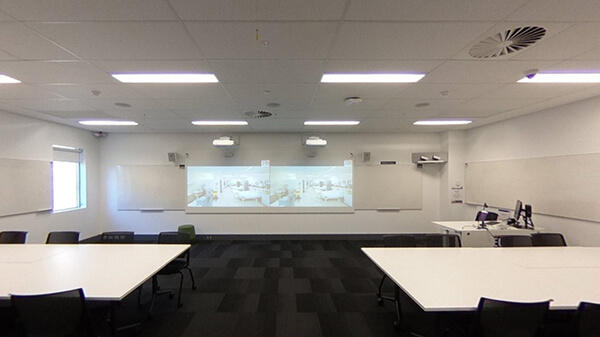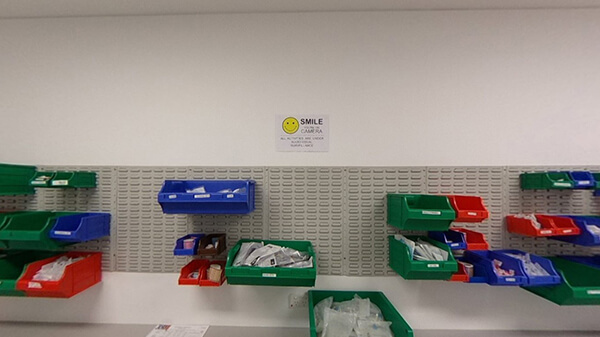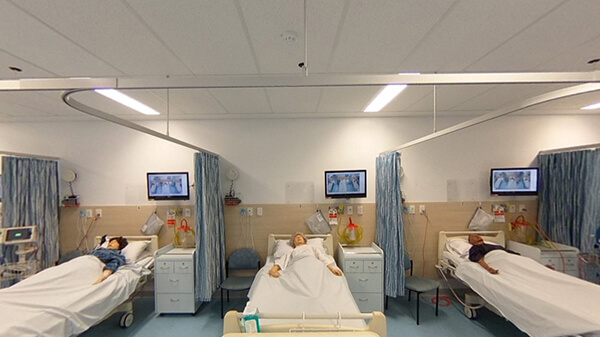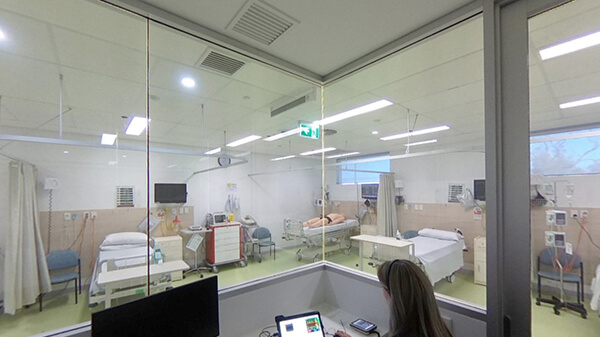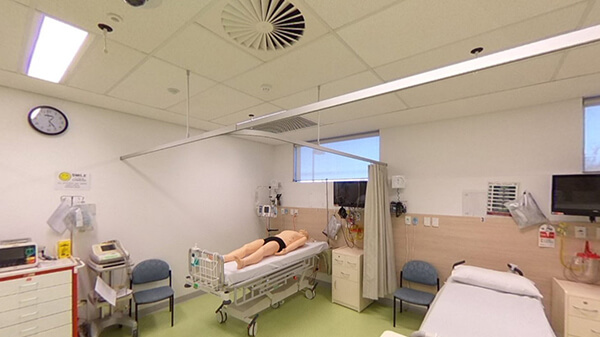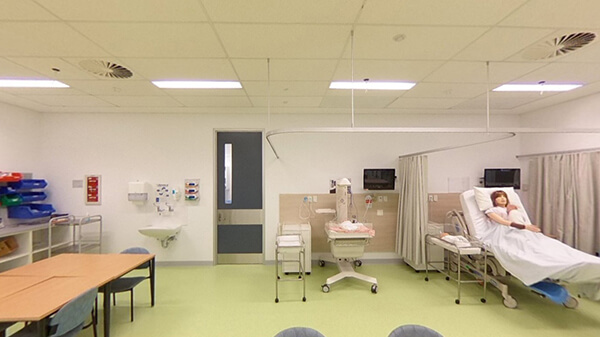Course code Y76
Bachelor of Science (Nursing)/Bachelor of Science (Midwifery)
Creative thinkers made here.
Creative thinkers made here.
Why study at ECU?
Toggle between study options for Domestic or International students
About this Course
This comprehensive course is unique in WA, preparing graduates for flexible career options in dynamic healthcare settings.
The course offers an innovative and broad study approach, with graduates ready for entry-level practice in both midwifery and nursing. It provides students with the knowledge and skills to deliver high quality care within the healthcare environment.
Australian Qualifications Framework (AQF) level
This course has been accredited by ECU as an AQF Level 7 Bachelor Degree Award.
Course code Y76
Entry requirements
75 Indicative ATAR
ECU admission and English language requirements apply.
See Course Entry for further information.
Fees
Commonwealth supported - estimated 1st year indicative fee AUD $6,150
See Fees and Scholarships for further information.
Availability & Campus
| Location | Semester 1 | Semester 2 |
|---|---|---|
| Joondalup | FT PT | |
| Mount Lawley | ||
| South West | FT PT | |
| Online |
Timetable
This course has a modified timetable. See Course Notes.
About this Course
This comprehensive course is unique in WA, preparing graduates for flexible career options in dynamic healthcare settings.
The course offers an innovative and broad study approach, with graduates ready for entry-level practice in both midwifery and nursing. It provides students with the knowledge and skills to deliver high quality care within the healthcare environment.
Australian Qualifications Framework (AQF) level
This course has been accredited by ECU as an AQF Level 7 Bachelor Degree Award.
Course code Y76
CRICOS code 097835K
Entry requirements
ECU admission and English language requirements apply.
See Course Entry for further information.
Fees
International students - estimated 1st year indicative fee AUD $51,000
See Fees and Scholarships for further information.
Availability & Campus
| Location | Semester 1 | Semester 2 |
|---|---|---|
| Joondalup | FT | |
| Mount Lawley | ||
| South West | FT | |
| Online |
Timetable
This course has a modified timetable. See Course Notes.
Course Entry
Admission requirements you'll need to meet for this course.
-
All applicants must meet the academic admission requirements for this course. The indicative or guaranteed ATAR is as published (where applicable) or academic admission requirements may be satisfied through completion of one of the following:
- AQF Diploma or equivalent;
- Undergraduate Certificate;
- Successfully completed 0.5 EFTSL of study at bachelor level or higher at an Australian higher education provider (or equivalent);
- Special Tertiary Admissions Test;*
- University Preparation Course;*
- Indigenous University Orientation Course; or*
- Aboriginal University Readiness Assessment.*
* Further information can be found on the Study course entry page.
For international students, requirements include your secondary school results.
-
In addition to satisfying ECU minimum English standard requirements for this course, all applicants must also demonstrate English language proficiency as specified in the Nursing and Midwifery Board of Australia (NMBA) English language skills registration standard. (https://www.nursingmidwiferyboard.gov.au/Registration-Standards/English-language-skills.aspx)
These requirements are as follows:
- IELTS Academic with a minimum overall score of 7.0 and a minimum score of 7.0 in each of the four components (listening, reading, writing and speaking), or
- Occupational English Test (OET) with a minimum score of B in each of the four components (listening, reading, writing and speaking), or
- Pearson English Test (PTE) Academic with a minimum overall score of 65 and a minimum score of 65 in each of the four communicative skills (listening, reading, writing and speaking), or
- TOEFL iBT with a minimum total score of 94 and the following minimum score in each section of the test:
- 24 for listening;
- 24 for reading,
- 27 for writing, and
- 23 for speaking, or
- Completion of at least six years of primary and secondary education taught and assessed solely in English in a recognised country as defined by the NMBA (including at least 2 years between years 7 and 12) with a supporting written declaration to confirm that your primary language is English, or
- Completion of at least 5 years full-time equivalent continuous combined secondary and/or tertiary and/or vocational education taught and assessed in a recognised country as defined by the NMBA, with a supporting written declaration to confirm whether your primary language is English. Note: The 5 years does not include the proposed ECU study.
Note: English tests must be completed within 2 years of the proposed course commencement date and additional requirements may apply in relation to acceptable number of test sittings and combined scores across test sittings.
ECUs minimum English standard requirements for this course may be satisfied with one of the following:
- Year 12 English ATAR/English Literature ATAR grade C or better or equivalent;
- Special Tertiary Admissions Test;*
- Successfully completed 1.0 EFTSL of study at bachelor level or higher in the UK, Ireland, USA, NZ or Canada;
- University Preparation Course;
- Indigenous University Orientation Course;*
- Aboriginal Student Intake Test;*
- AQF Diploma, Advanced Diploma or Associate Degree; or
- Successfully completed 0.375 EFTSL of study at bachelor level or higher at an Australian higher education provider (or equivalent).
Applications for this course are not accepted through ECU's Experience Based Entry Scheme.
Course Entry
Admission requirements you'll need to meet for this course.
-
All applicants must meet the academic admission requirements for this course. The indicative or guaranteed ATAR is as published (where applicable) or academic admission requirements may be satisfied through completion of one of the following:
- AQF Diploma or equivalent;
- Undergraduate Certificate;
- Successfully completed 0.5 EFTSL of study at bachelor level or higher at an Australian higher education provider (or equivalent);
- Special Tertiary Admissions Test;*
- University Preparation Course;*
- Indigenous University Orientation Course; or*
- Aboriginal University Readiness Assessment.*
* Further information can be found on the Study course entry page.
For international students, requirements include your secondary school results.
-
In addition to satisfying ECU minimum English standard requirements for this course, all applicants must also demonstrate English language proficiency as specified in the Nursing and Midwifery Board of Australia (NMBA) English language skills registration standard. (https://www.nursingmidwiferyboard.gov.au/Registration-Standards/English-language-skills.aspx)
These requirements are as follows:
- IELTS Academic with a minimum overall score of 7.0 and a minimum score of 7.0 in each of the four components (listening, reading, writing and speaking), or
- Occupational English Test (OET) with a minimum score of B in each of the four components (listening, reading, writing and speaking), or
- Pearson English Test (PTE) Academic with a minimum overall score of 65 and a minimum score of 65 in each of the four communicative skills (listening, reading, writing and speaking), or
- TOEFL iBT with a minimum total score of 94 and the following minimum score in each section of the test:
- 24 for listening;
- 24 for reading,
- 27 for writing, and
- 23 for speaking, or
- Completion of at least six years of primary and secondary education taught and assessed solely in English in a recognised country as defined by the NMBA (including at least 2 years between years 7 and 12) with a supporting written declaration to confirm that your primary language is English, or
- Completion of at least 5 years full-time equivalent continuous combined secondary and/or tertiary and/or vocational education taught and assessed in a recognised country as defined by the NMBA, with a supporting written declaration to confirm whether your primary language is English. Note: The 5 years does not include the proposed ECU study.
Note: English tests must be completed within 2 years of the proposed course commencement date and additional requirements may apply in relation to acceptable number of test sittings and combined scores across test sittings.
ECUs minimum English standard requirements for this course may be satisfied with one of the following:
- Year 12 English ATAR/English Literature ATAR grade C or better or equivalent;
- Special Tertiary Admissions Test;*
- Successfully completed 1.0 EFTSL of study at bachelor level or higher in the UK, Ireland, USA, NZ or Canada;
- University Preparation Course;
- Indigenous University Orientation Course;*
- Aboriginal Student Intake Test;*
- AQF Diploma, Advanced Diploma or Associate Degree; or
- Successfully completed 0.375 EFTSL of study at bachelor level or higher at an Australian higher education provider (or equivalent).
Applications for this course are not accepted through ECU's Experience Based Entry Scheme.
Course Details
Semester availability
Semester 1: Study full-time at Joondalup, South West
Semester 1: Study part-time at Joondalup, South West
Course Structure
| Unit Code | Unit Title | Credit Points |
|---|---|---|
| NPU1101 | Nursing Practice 1 | 15 |
| NUM1101 | Nursing and Midwifery in the Australian Healthcare Context | 15 |
| SCN1111 | Human Processes 1 | 15 |
| NUM1102 | Communication for Nurses and Midwives | 15 |
| MIT1101 | Dimensions of Healthy Childbearing | 15 |
| Unit Code | Unit Title | Credit Points |
|---|---|---|
| NPU1202 | Nursing Practice 2 | 15 |
| NUR1402 | Older Adult Health | 15 |
| HPU1202 | Human Processes 2 | 15 |
| MIT1102 | Principles of Midwifery and Woman-Centred Care | 15 |
| MIP1101 | Introduction to Midwifery Practice 1 | 15 |
| Unit Code | Unit Title | Credit Points |
|---|---|---|
| NPU2303 | Nursing Practice 3 | 15 |
| FCA2303 | Chronic Conditions and Supportive Care | 15 |
| HPU2303 | Human Processes 3 | 15 |
| NUM1308 | Aboriginal and Torres Strait Islander Peoples' Health and Wellness | 15 |
| MIP2103 | Midwifery Practice 2: Pregnancy Care | 15 |
| Unit Code | Unit Title | Credit Points |
|---|---|---|
| NPU2404 | Nursing Practice 4 | 15 |
| NUM2307 | Mental Health and Wellbeing in Clinical Practice | 15 |
| HPU2404 | Human Processes 4 | 15 |
| MIP2104 | Midwifery Practice 3: Intrapartum Midwifery Care | 15 |
| MIT2102 | Care of the Birthing Woman | 15 |
| Unit Code | Unit Title | Credit Points |
|---|---|---|
| HPU3505 | Human Processes 5 | 15 |
| NPU3505 | Nursing Practice 5 | 15 |
| NUM2405 | Legal and Ethical Practice in Nursing and Midwifery | 15 |
| MIP3104 | Midwifery Practice 4: Postnatal Care | 15 |
| MIT3102 | Postnatal Care of Women and their Families | 15 |
| Unit Code | Unit Title | Credit Points |
|---|---|---|
| NUR3503 | Children and Young People's Health and Wellbeing | 15 |
| NUM2404 | Transition to Registered Practice | 15 |
| NUM3505 | Interprofessional Practice in Health Care | 15 |
| MIP3105 | Midwifery Practice 5: Supporting the Newborn | 15 |
Y76|6
For more detailed unit information for this course take a look at our Handbook. To organise your life for next semester visit the Teaching timetable.
Student handbookCourse notes
Important course notes
-
Prospective applicants are advised that there is an 'on call' component to this course. It is a requirement in Australia that midwifery students provide Continuity of Care for ten women throughout the course of their studies; this includes being on call to attend them when they give birth.
Students should be aware that unit overloads will be required in some semesters, in order to complete the course within the standard course duration. -
Students are required to successfully complete 800 hours of nursing clinical practice and 720 hours of midwifery clinical practice. Students are also required to follow ten women throughout their pregnancy journey, this includes being on call to attend them when they give birth.
All students enrolled in this Course must be registered as a student with the Nursing and Midwifery Board of Australia (NMBA) prior to the commencement of their studies. Students do not need to apply for registration with NMBA, the University will automatically register all students in the Course prior to commencing.
Students enrolled in entry-to-practice programs will be required to travel to professional experience placements in a variety of health services within the region of the campus they are enrolled and may be required to travel to other regions of Western Australia. Students enrolled at ECU South West will be required to travel to Perth for some clinical placements. Students are responsible for any travel and accommodation related costs. Professional experience placements require rostered shifts covering the 24-hour period, inclusive of weekends and public holidays. Students are expected not to undertake paid employment during a period of full-time professional experience placement, as it is a requirement that students have sufficient breaks.Attendance requirements
Students will undertake clinical practicum during the hours laid down by their host clinical agency. These full-time clinical blocks may occur at times outside the identified semester weeks. Additionally, pre-identified clinical practicum periods may change with minimal notice to students due to circumstances outside the control of the School.
Clearances and/or Risk Management Protocols Required
To be eligible to undertake clinical practice and fulfil their duty of care, students are required to complete clinical practice orientation, risk management training and obtain various screening, vaccination and clearances, as appropriate on commencement of the course and in subsequent semesters. A list of these requirements is accessible on the School of Nursing and Midwifery website.
Due to the practical nature of the nursing and midwifery professions and protection of the public, there are inherent requirements applicable to this course that may impact upon the success of some potential students. Applicants and students with a disability or other issue likely to impact on their ability to perform in practice are encouraged to contact the Associate Dean, Work Integrated Learning to discuss their situation.
More information can be found at https://www.ecu.edu.au/schools/nursing-and-midwifery/nursing-and-midwifery-clinical-placements
There are vaccination or other similar requirements that apply to placements, including those imposed by government or third-party placement hosts, which must be completed as a component of this course. Potential students should consider this requirement before enrolling in this course and discuss with the course coordinator if this raises any concerns. Students may not be able to complete placement units if they are unable to meet the placement requirements, which may impact on their ability to complete this course.Professional practice rules
Registered nurse standards for practice
Midwife standards for practice
Professional codes of conduct -
Students will need to graduate to be eligible to register with the Nursing and Midwifery Board of Australia. Registration with the Nursing and Midwifery Board of Australia is required to practice in the profession.
Course learning outcomes
- Analyse evidence-based nursing and midwifery practice in a diverse range of contexts, incorporating digital and information literacy skills.
- Effectively communicate and collaborate within an interprofessional context, to sustain culturally safe, therapeutic and professional relationships.
- Demonstrate lifelong learning through critical reflection and ongoing development within professional practice.
- Integrate knowledge and skills to assess, plan, implement and evaluate safe, quality nursing and midwifery care, to ethically and effectively respond to diverse healthcare challenges.
- Incorporate culturally safe and competent care within all aspects of professional practice when working collaboratively with women, patients, families and communities.
- Incorporates health promotion and wellbeing through the application of evidence based nursing and midwifery practice.
Professional Recognition
CourseAccredited by: Australian Nursing and Midwifery Accreditation Council (ANMAC)
Course Details
Semester availability
Semester 1: Study full-time at Joondalup, South West
Course Structure
| Unit Code | Unit Title | Credit Points |
|---|---|---|
| NPU1101 | Nursing Practice 1 | 15 |
| NUM1101 | Nursing and Midwifery in the Australian Healthcare Context | 15 |
| SCN1111 | Human Processes 1 | 15 |
| NUM1102 | Communication for Nurses and Midwives | 15 |
| MIT1101 | Dimensions of Healthy Childbearing | 15 |
| Unit Code | Unit Title | Credit Points |
|---|---|---|
| NPU1202 | Nursing Practice 2 | 15 |
| NUR1402 | Older Adult Health | 15 |
| HPU1202 | Human Processes 2 | 15 |
| MIT1102 | Principles of Midwifery and Woman-Centred Care | 15 |
| MIP1101 | Introduction to Midwifery Practice 1 | 15 |
| Unit Code | Unit Title | Credit Points |
|---|---|---|
| NPU2303 | Nursing Practice 3 | 15 |
| FCA2303 | Chronic Conditions and Supportive Care | 15 |
| HPU2303 | Human Processes 3 | 15 |
| NUM1308 | Aboriginal and Torres Strait Islander Peoples' Health and Wellness | 15 |
| MIP2103 | Midwifery Practice 2: Pregnancy Care | 15 |
| Unit Code | Unit Title | Credit Points |
|---|---|---|
| NPU2404 | Nursing Practice 4 | 15 |
| NUM2307 | Mental Health and Wellbeing in Clinical Practice | 15 |
| HPU2404 | Human Processes 4 | 15 |
| MIP2104 | Midwifery Practice 3: Intrapartum Midwifery Care | 15 |
| MIT2102 | Care of the Birthing Woman | 15 |
| Unit Code | Unit Title | Credit Points |
|---|---|---|
| HPU3505 | Human Processes 5 | 15 |
| NPU3505 | Nursing Practice 5 | 15 |
| NUM2405 | Legal and Ethical Practice in Nursing and Midwifery | 15 |
| MIP3104 | Midwifery Practice 4: Postnatal Care | 15 |
| MIT3102 | Postnatal Care of Women and their Families | 15 |
| Unit Code | Unit Title | Credit Points |
|---|---|---|
| NUR3503 | Children and Young People's Health and Wellbeing | 15 |
| NUM2404 | Transition to Registered Practice | 15 |
| NUM3505 | Interprofessional Practice in Health Care | 15 |
| MIP3105 | Midwifery Practice 5: Supporting the Newborn | 15 |
Y76|6
For more detailed unit information for this course take a look at our Handbook. To organise your life for next semester visit the Teaching timetable.
Student handbookCourse notes
Important course notes
-
Prospective applicants are advised that there is an 'on call' component to this course. It is a requirement in Australia that midwifery students provide Continuity of Care for ten women throughout the course of their studies; this includes being on call to attend them when they give birth.
Students should be aware that unit overloads will be required in some semesters, in order to complete the course within the standard course duration. -
Students are required to successfully complete 800 hours of nursing clinical practice and 720 hours of midwifery clinical practice. Students are also required to follow ten women throughout their pregnancy journey, this includes being on call to attend them when they give birth.
All students enrolled in this Course must be registered as a student with the Nursing and Midwifery Board of Australia (NMBA) prior to the commencement of their studies. Students do not need to apply for registration with NMBA, the University will automatically register all students in the Course prior to commencing.
Students enrolled in entry-to-practice programs will be required to travel to professional experience placements in a variety of health services within the region of the campus they are enrolled and may be required to travel to other regions of Western Australia. Students enrolled at ECU South West will be required to travel to Perth for some clinical placements. Students are responsible for any travel and accommodation related costs. Professional experience placements require rostered shifts covering the 24-hour period, inclusive of weekends and public holidays. Students are expected not to undertake paid employment during a period of full-time professional experience placement, as it is a requirement that students have sufficient breaks.Attendance requirements
Students will undertake clinical practicum during the hours laid down by their host clinical agency. These full-time clinical blocks may occur at times outside the identified semester weeks. Additionally, pre-identified clinical practicum periods may change with minimal notice to students due to circumstances outside the control of the School.
Clearances and/or Risk Management Protocols Required
To be eligible to undertake clinical practice and fulfil their duty of care, students are required to complete clinical practice orientation, risk management training and obtain various screening, vaccination and clearances, as appropriate on commencement of the course and in subsequent semesters. A list of these requirements is accessible on the School of Nursing and Midwifery website.
Due to the practical nature of the nursing and midwifery professions and protection of the public, there are inherent requirements applicable to this course that may impact upon the success of some potential students. Applicants and students with a disability or other issue likely to impact on their ability to perform in practice are encouraged to contact the Associate Dean, Work Integrated Learning to discuss their situation.
More information can be found at https://www.ecu.edu.au/schools/nursing-and-midwifery/nursing-and-midwifery-clinical-placements
There are vaccination or other similar requirements that apply to placements, including those imposed by government or third-party placement hosts, which must be completed as a component of this course. Potential students should consider this requirement before enrolling in this course and discuss with the course coordinator if this raises any concerns. Students may not be able to complete placement units if they are unable to meet the placement requirements, which may impact on their ability to complete this course.Professional practice rules
Registered nurse standards for practice
Midwife standards for practice
Professional codes of conduct -
Students will need to graduate to be eligible to register with the Nursing and Midwifery Board of Australia. Registration with the Nursing and Midwifery Board of Australia is required to practice in the profession.
Course learning outcomes
- Analyse evidence-based nursing and midwifery practice in a diverse range of contexts, incorporating digital and information literacy skills.
- Effectively communicate and collaborate within an interprofessional context, to sustain culturally safe, therapeutic and professional relationships.
- Demonstrate lifelong learning through critical reflection and ongoing development within professional practice.
- Integrate knowledge and skills to assess, plan, implement and evaluate safe, quality nursing and midwifery care, to ethically and effectively respond to diverse healthcare challenges.
- Incorporate culturally safe and competent care within all aspects of professional practice when working collaboratively with women, patients, families and communities.
- Incorporates health promotion and wellbeing through the application of evidence based nursing and midwifery practice.
Professional Recognition
CourseAccredited by: Australian Nursing and Midwifery Accreditation Council (ANMAC)
Fees and Scholarships
Fees
- AUD $6,150 - Commonwealth supported estimated 1st year indicative fee 1
Note
1 The 'estimated 1st year indicative fee' is provided as a guide only, based on a typical enrolment of students undertaking the first year of this course. At ECU, you pay for the individual units you enrol in, not an overall course fee, so the total cost of your course will vary, depending on what units you choose. An indicative fee will be provided with your course offer, however you can use our Course Fee Calculator to estimate the actual amount you'll need to pay. ECU fees are adjusted annually.
Some units require the payment of a fee for incidental goods or services required to complete those units. For more information and the full list of incidental fees for courses and units, visit What are Incidental Fees.
Scholarships
ECU has a scholarship program that provides many opportunities each year to students undertaking studies here.
Find a scholarshipCareer Opportunities
Possible future job titles
Midwife, Regional Midwife, Rural Midwife, Remote Midwife, Nurse, Registered Nurse
Similar courses to consider
Fees and Scholarships
Fees
- AUD $51,000 - International students estimated 1st year indicative fee 1
Note
1 The 'estimated 1st year indicative fee' is provided as a guide only, and has been calculated based on a typical enrolment of students undertaking the first year of this course. At ECU, you pay for each individual unit you enrol in, not an overall course fee, so the total cost of your course will vary, depending on what units you choose. An indicative fee will be provided with your course offer, however you can use our Course Fee Calculator to estimate the actual amount you'll need to pay. ECU fees are adjusted annually.
Some units require the payment of a fee for incidental goods or services required to complete those units. For more information and the full list of incidental fees for courses and units, visit What are Incidental Fees.
Scholarships
ECU has a scholarship program that provides many opportunities each year to students undertaking studies here.
Find a scholarshipCareer Opportunities
Possible future job titles
Midwife, Regional Midwife, Rural Midwife, Remote Midwife, Nurse, Registered Nurse
Similar courses to consider
Need some help deciding what to study?
Our future student events include a mix of on-campus and online sessions designed to help you decide what to study at ECU.
Creative thinkers start here
Facilities
Explore your options
Creative thinkers start here
Facilities
Explore your options
Student stories
Quick guide to uni-speak
-
-
The Australian Qualifications Framework (AQF) is the national regulator of qualifications in the Australian education and training system. The AQF defines the essential characteristics, including the required learning outcomes, of the different types of qualifications issued across the higher education systems in Australia.
-
ATAR is the Australian Tertiary Admission Rank, the primary criterion for entry into most undergraduate university courses in Australia. The ATAR is a percentile score which denotes a student's ranking relative to their state-wide peers upon completion of their secondary education.
-
CRICOS is the Commonwealth Register of Institutions and Courses for Overseas Students. A CRICOS code is allocated to education institutions (like ECU) who are approved to recruit, enrol and deliver education to overseas students. Courses with a CRICOS code are available to international students who meet the entry requirements.
-
A major, or unit set, is your chosen area of in-depth study in an undergraduate course. It usually involves 8 units of study, or one-third of the units in a 3-year degree. Talk to your Student Information Office if you need help choosing a major subject.
-
Minors include between 4 and 6 study units in a specific discipline. Not all courses require you to complete a minor. Your minor subject doesn't appear on your printed degree (parchment), but is part of your academic transcript.
-
If you're enrolled in 3 or more units in a semester this is considered full-time study. To complete most 3-year degrees studying full-time you'll need to complete 4 units per semester, i.e. 24 units over 3 years.
-
-
-
If a course is available to study part-time you can generally expect it to take twice as long to complete as it would in full-time mode. Part-time students are enrolled in 1 or 2 units maximum per semester.
Note: International students who hold a student visa can only choose the full-time study option for our courses. This is to ensure the course is completed within the duration of the student visa.
-
Most courses start in Semester 1 each year, usually in the last week of February. Some courses can be started in Semester 2 (we call this mid-year). There's a week of Orientation before each semester to help you get used to uni life.
-
A lot of our courses start in Semester 2 each year, usually in the last week of July. We call this mid-year. There's a week of Orientation beforehand to help you get used to uni life.
-
We use a points system to make it easier for you to understand your study progress. Most Bachelors degree study units are allocated 15 credit points. If you're studying a 3-year full-time degree you'll need to successfully complete 360 credit points - that's 24 units x 15 points per unit.
-
These are compulsory units you have to successfully complete as part of your course.
-
An elective is a unit you choose to study that counts towards your course requirements, but isn't compulsory. For some courses we recommend elective units. In some situations, a course coordinator may approve an elective unit as a replacement for a compulsory one.
-
Quick guide to uni-speak
-
-
The Australian Qualifications Framework (AQF) is the national regulator of qualifications in the Australian education and training system. The AQF defines the essential characteristics, including the required learning outcomes, of the different types of qualifications issued across the higher education systems in Australia.
-
ATAR is the Australian Tertiary Admission Rank, the primary criterion for entry into most undergraduate university courses in Australia. The ATAR is a percentile score which denotes a student's ranking relative to their state-wide peers upon completion of their secondary education.
-
CRICOS is the Commonwealth Register of Institutions and Courses for Overseas Students. A CRICOS code is allocated to education institutions (like ECU) who are approved to recruit, enrol and deliver education to overseas students. Courses with a CRICOS code are available to international students who meet the entry requirements.
-
A major, or unit set, is your chosen area of in-depth study in an undergraduate course. It usually involves 8 units of study, or one-third of the units in a 3-year degree. Talk to your Student Information Office if you need help choosing a major subject.
-
Minors include between 4 and 6 study units in a specific discipline. Not all courses require you to complete a minor. Your minor subject doesn't appear on your printed degree (parchment), but is part of your academic transcript.
-
If you're enrolled in 3 or more units in a semester this is considered full-time study. To complete most 3-year degrees studying full-time you'll need to complete 4 units per semester, i.e. 24 units over 3 years.
-
-
-
If a course is available to study part-time you can generally expect it to take twice as long to complete as it would in full-time mode. Part-time students are enrolled in 1 or 2 units maximum per semester.
Note: International students who hold a student visa can only choose the full-time study option for our courses. This is to ensure the course is completed within the duration of the student visa.
-
Most courses start in Semester 1 each year, usually in the last week of February. Some courses can be started in Semester 2 (we call this mid-year). There's a week of Orientation before each semester to help you get used to uni life.
-
A lot of our courses start in Semester 2 each year, usually in the last week of July. We call this mid-year. There's a week of Orientation beforehand to help you get used to uni life.
-
We use a points system to make it easier for you to understand your study progress. Most Bachelors degree study units are allocated 15 credit points. If you're studying a 3-year full-time degree you'll need to successfully complete 360 credit points - that's 24 units x 15 points per unit.
-
These are compulsory units you have to successfully complete as part of your course.
-
An elective is a unit you choose to study that counts towards your course requirements, but isn't compulsory. For some courses we recommend elective units. In some situations, a course coordinator may approve an elective unit as a replacement for a compulsory one.
-



